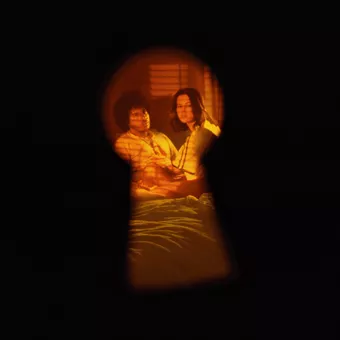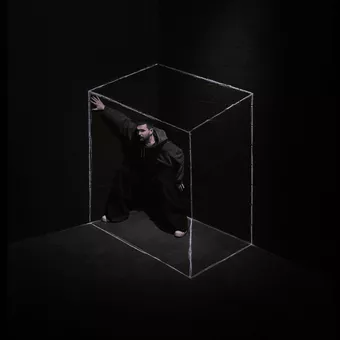Marina Sena – Anjo Lyrics
[Letra de “Anjo”]
[Verso]
Eu tenho um anjo pra chamar de meu
Quando eu me perco, ele me encontra, e eu entendo essa minha obsessão
Se ele não ‘tá aqui, eu tô no Rio
Eu paro tudo pra te ver e rio, quando diz que vem num disco voador
[Pré-Refrão]
Que vai me ver em todo lugar, vai desenhar meu olhar no céu
Que meu amor tem gosto de mel, parei de brincar, só vou se você
Meu patuá, meu azul-pincеl, pra me pintar de colorido
Mas é só me soltar, quе eu volto a ser serpente no mar profundo
[Refrão]
É que eu tô com medo, é que eu não sou pura
Você vai se entregar, e eu vou te amar, mas eu não quero ser sua
É que eu tô com medo, é que eu não sou pura
Você vai se entregar, e eu vou te amar, mas eu não quero ser sua
[Verso]
Eu tenho um anjo pra chamar de meu
Quando eu me perco, ele me encontra, e eu entendo essa minha obsessão
Se ele não ‘tá aqui, eu tô no Rio
Eu paro tudo pra te ver e rio, quando diz que vem num disco voador
Que vai me ver em todo lugar, vai desenhar meu olhar no céu
Que meu amor tem gosto de mel, parei de brincar, só vou se você
Meu patuá, meu azul-pincel, pra me pintar de colorido
Mas é só me soltar, que eu volto a ser serpente no mar profundo[Refrão]
É que eu tô com medo, é que eu não sou pura
Você vai se entregar, e eu vou te amar, mas eu não quero ser sua
É que eu tô com medo, é que eu não sou pura
Você vai se entregar, e eu vou te amar, mas eu não quero ser sua
Marina Sena – Anjo
Song Details
- Title: Anjo
- Artist: Marina Sena
- Genre: Brazilian Pop, Indie Pop
- Release Year: 2021
- Language: Portuguese
- Themes: Love, Fear, Self-awareness, Obsession, Freedom, Emotional Conflict
- Mood: Introspective, Emotional, Vulnerable, Empowering
In-Depth Lyric Analysis
Verse 1:
- “Eu tenho um anjo pra chamar de meu / Quando eu me perco, ele me encontra, e eu entendo essa minha obsessão” In these opening lines, the speaker describes having an “angel” who guides and supports her when she feels lost. The term “anjo” (angel) could be literal or metaphorical, representing someone or something that offers emotional guidance and comfort. The line also introduces the speaker’s obsession, suggesting that her attachment to this figure is intense and perhaps consuming.
- “Se ele não ‘tá aqui, eu tô no Rio / Eu paro tudo pra te ver e rio, quando diz que vem num disco voador” The mention of being in Rio suggests a sense of escape or transition, indicating that the speaker is constantly searching for the “angel” or feeling out of place when they’re not together. The playful image of the angel coming in a “flying saucer” adds an element of fantasy and whimsy, hinting at the dreamlike nature of the speaker’s attachment.
Pre-Chorus:
- “Que vai me ver em todo lugar, vai desenhar meu olhar no céu / Que meu amor tem gosto de mel, parei de brincar, só vou se você” The speaker envisions the “angel” as someone who will be present everywhere, intimately connected with her. The desire for attention and connection is highlighted here, with the metaphor of the angel “drawing her gaze in the sky,” suggesting an almost celestial and all-encompassing bond. The speaker’s love is described as sweet (“gosto de mel”), but there’s a sense of maturity or seriousness (“parei de brincar”), indicating that this love is not just whimsical—it’s something the speaker is ready to engage with, but only if the other person is equally committed.
- “Meu patuá, meu azul-pincel, pra me pintar de colorido / Mas é só me soltar, que eu volto a ser serpente no mar profundo” The “patuá” (a protective amulet) and “azul-pincel” (blue paintbrush) symbolize the speaker’s need for protection, identity, and expression. The idea of being “painted colorful” suggests that the speaker wants to express herself fully and authentically. However, the line “me soltar, que eu volto a ser serpente no mar profundo” introduces a sense of danger or self-doubt, suggesting that without control, the speaker can return to a more intense, unpredictable, and possibly destructive state (“serpente no mar profundo” could symbolize a return to emotional turmoil or chaos).
Chorus:
- “É que eu tô com medo, é que eu não sou pura / Você vai se entregar, e eu vou te amar, mas eu não quero ser sua” In the chorus, the speaker admits to being afraid—not only of the potential for vulnerability but also of the emotional consequences of giving in to this love. The phrase “não sou pura” suggests a self-awareness of her imperfections or emotional complexity. While she acknowledges that the other person may be willing to surrender to the relationship (“você vai se entregar”), she asserts that she doesn’t want to be bound by it (“não quero ser sua”). This reveals an internal conflict between wanting love and needing freedom.
Verse 2:
The second verse mirrors the first, reiterating the speaker’s obsession with the “angel” and the sense of unfulfilled longing. The imagery of stopping everything to see the “angel” again emphasizes the intensity of the emotional pull, reinforcing the reliance on this figure for emotional balance.
Pre-Chorus (Reprise):
The reprise of the pre-chorus emphasizes the inner tension within the speaker. While she seeks connection and love (“meu amor tem gosto de mel”), she remains hesitant and wary of fully surrendering to it. The metaphor of the “serpente” (serpent) again underscores the potential for destructive behavior or emotional volatility if she is not careful.
Chorus (Reprise):
The chorus repeats the earlier sentiments, underlining the fear of attachment and the desire for freedom. The speaker’s internal conflict persists, as she desires to love but remains cautious of the emotional price that may come with it.
Song Meaning
“Anjo” is a song that explores the emotional conflict between desire and fear. The speaker finds solace and guidance in an “angel,” who symbolizes someone or something that offers comfort and emotional stability. However, there is an obsession with this figure, and the speaker struggles with the intensity of her attachment. While she acknowledges her love for this person, she also fears losing herself or becoming too dependent on them.
The song speaks to the internal tension between the desire for connection and the need for independence. The speaker wants to love but also values her freedom and individuality, leading to the repeated refrain, “não quero ser sua” (I don’t want to be yours). This line captures the fear of being possessed or defined by another person, even if there is genuine affection and emotional attachment.
The use of metaphors, like the “serpente” (serpent) and the “patuá” (protective amulet), highlights the speaker’s internal struggle with her own emotional complexity and her awareness of her capacity for both vulnerability and emotional intensity.
Ultimately, “Anjo” is a song about the paradox of love: wanting to be loved but also needing space and self-preservation. It’s about navigating the fine line between attachment and freedom, and the fear that can come with both.
Frequently Asked Questions (FAQs)
- What does the “anjo” represent in the song? The “anjo” (angel) is a metaphor for someone who provides comfort and emotional guidance to the speaker. It can symbolize a person, a feeling, or even an idealized sense of peace that the speaker seeks.
- What is the significance of the serpent imagery? The serpent represents the speaker’s emotional complexity. The idea of becoming a “serpente no mar profundo” suggests a return to a more intense and destructive state, indicating that the speaker’s emotions can be both healing and chaotic.
- Why does the speaker say, “não quero ser sua”? This line expresses the speaker’s fear of losing her identity in the relationship. While she loves the other person, she does not want to be defined or possessed by them. It’s a declaration of her need for independence even within a relationship.
- What is the role of the “patuá” and “azul-pincel” in the song? These objects represent protection, identity, and expression. The speaker seeks to be painted in color, symbolizing her desire to express herself freely, but also acknowledges the potential danger in giving in to her emotions without control.
- What does the song ultimately convey about love? “Anjo” conveys the complexity of love—the balance between desire and independence, the need for connection but also the fear of losing oneself in the process. The song speaks to the emotional vulnerability and self-awareness that come with being in a relationship.







